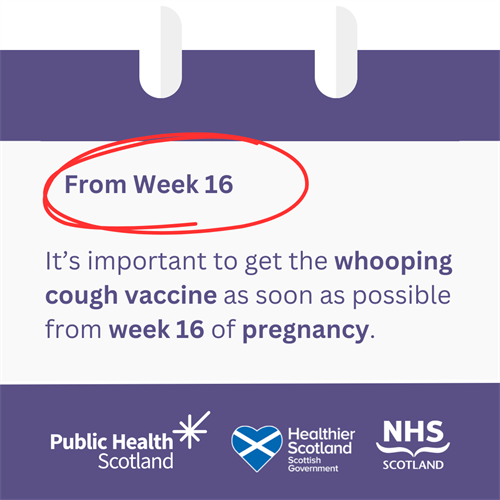
Key contacts:
What is whooping cough?
Whooping cough, also known as Pertussis or the 100-day cough is a bacterial infection of the lungs and airways and can last for several weeks or even months. It is a contagious disease, especially in the first three weeks of infection, and can be serious for babies.
Babies and young children are at increased risk of complications from whooping cough. It can also lead to other serious conditions like pneumonia, kidney problems and permanent brain damage caused by a lack of oxygen to the brain. In the worst cases, whooping cough can be life threatening.
Having the whooping cough vaccine during pregnancy is the best way to protect you and your baby from becoming infected.
Whooping cough symptoms:
- Whooping cough starts with cold like symptoms, such as a runny nose and sore throat, before developing some of the following symptoms:
- coughing episodes which last a few minutes and making a “whoop” sound when gasping for breath between coughs (not all young babies or adults make this sound).
- skin develops a slight blue or grey colour
- coughing up thick mucus, leading to vomiting.
About the Whooping cough vaccine
In Scotland, the whooping cough vaccine is offered to everyone who is pregnant. Pregnant women are offered the vaccine from week 16 of pregnancy. Having the vaccine lowers your risk of getting whooping cough and passing it to your baby.
When you get the whooping cough vaccine, your body makes antibodies, which your body uses to fight-off infection. These antibodies transfer from you to your unborn baby through the placenta. This means that your baby will have some protection from whooping cough as soon as they are born.
It is better to get the whooping cough vaccine as soon as possible as this gives more time for your body to pass antibodies to your baby.
Whooping cough vaccine
Most pregnant women will receive the ADACEL vaccine. This vaccine protects against 3 different diseases: Whooping cough, diphtheria and tetanus.
Most people do not experience any, or only mild side effects after having the vaccine. Side effects might include: a sore arm or irritation when the vaccine was injected, mild fever or headache. This shows that the vaccine is teaching your body’s immune system how to protect itself from whooping cough. More serious side effects are extremely rare.
Your midwife will discuss the whooping cough vaccine with you and answer any questions you might have at your appointment.